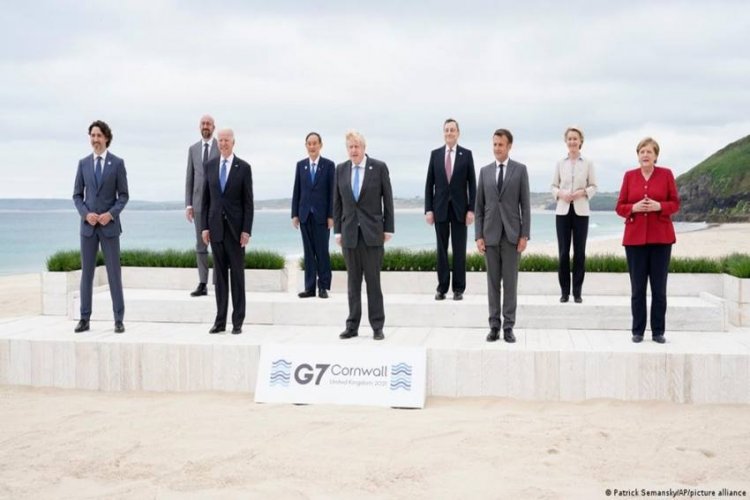G-7 Summit: India aligns with the West on China
STORIES, ANALYSES, EXPERT VIEWS

The G-7 summit last week, sent out a strong message by US President Biden that “America is back” to take the lead on global challenges. The second message was the consensus amongst the seven-member countries on countering China. The final G-7 communique has four direct references to China, each negative, including criticising Beijing for its rights record in Xinjiang and democratic freedoms in Hong Kong, its “non-market policies and practices...”, concerns over its actions in the China Seas, and a demand for a transparent investigation into the origins of the COVID-19 virus.
It is however, significant argues The Hindu “that the G-7 outreach communiqués that included the guest countries, did not make the same references to China as the main document, and MEA officials clarified that Chinese aggression was not raised at the outreaches, which focused on the pandemic, climate change and democratic freedoms.”
‘Beginning of an institutionalisation of India’s cooperation with the West’
India, nevertheless made its own impact. Interpreting Prime Minister Narendra Modi’s virtual participation in the G7 summit last week, C Raja Mohan (director, Institute of South Asian Studies, National University of Singapore and contributing editor on international affairs for The Indian Express), identifies two important messages. “One is Prime Minister Narendra Modi’s proclamation that India is a ‘natural ally’ of the G-7 and its partners. The other is the emphasis on shared democratic values that bind India with the West. This was reflected in a statement on ‘open societies’ that India issued along with the members of the G-7 and three other invited guests — Australia, South Africa and South Korea.
“The two ideas are certainly not new to India’s foreign policy, but they acquire special importance at the current juncture. Back in the autumn of 1998, Prime Minister Atal Bihari Vajpayee declared in New York that India and the US could be ‘natural allies’……..…But India’s bonhomie with the US did not automatically compute into broader warmth towards the West as a collective. That has begun to change in the last few years, as Delhi embarked on an expansive engagement with Europe. The Cornwall summit can be seen as the beginning of an institutionalisation of India’s cooperation with the West.”
‘Coalition of democracies’
A case for a ‘coalition of democracies’, says Mohan “was certainly gaining ground over the last two decades,” but “the powerful force of economic globalisation and the absence of great power rivalry meant there was no compelling policy urgency to construct” such an alliance. “That condition has altered radically in the last few years amidst the growing US tensions with China and Russia. The Trump Administration’s national security strategy had proclaimed the return of great power competition with China and Russia.
“The Biden Administration has brought even greater intensity to this new approach by defining a deepening contradiction between the world’s democracies and autocracies………”
Rupture in US, China relations coincides with the deterioration in India, China relations
Significantly, Mohan points “the rupture in the US engagement with China coincides with the rapid deterioration in Delhi’s relations with Beijing and sets up a new context for India’s partnership with the West. If the Indo-Pacific provides a regional basis for India’s engagement with the US and Europe, mitigating climate change and the management of the Covid-19 pandemic provides a global template for India’s engagement with the West.”
On Covid, ‘science, geography and politics could create a potent brew’ for China
The above global template also provides an opportunity for India to have a re-look at its relations with China. Of late, writes Lt Gen Prakash Menon, retd (Director, Strategic Studies Programme, Takshashila Institution, and former military adviser, National Security Council Secretariat) “Covid-19 has been getting a geopolitical boost from the tailwinds of political and scientific narratives originating primarily from the US. In May, US President Joe Biden ordered an intelligence probe into the origins of the novel coronavirus or SARS-CoV-2. The fact that it originated in China is undisputed. Scientific suspicions that the virus is an artificial creation and probably leaked from the Wuhan Institute of Virology have now received a booster dose………”
In the case of Covid-19 therefore, “science, geography and politics could create a potent brew in the information age. In global geopolitics, this could become deadly for China. For China’s detractors, it might provide informational fuel and create the psychological effect that can, at the global level, drive popular anger directed against the country. It is an anger that has the potential to sustain because of the colossal damage caused by Covid to lives and livelihood.
“The potency of the brew will depend on the narratives that are internalised at the popular level and the ability of political leadership to direct their application. Both scientific and political acumen can play a major role……..”
For China to “confront the intellectual horsepower of the Western scientific community…….will not be an easy task and, therefore, it will resort to what it is good at – conceal, obfuscate, deceive and distract……..As long as China’s power is on the rise, it will surely garner the support of its current set of friends like Russia, Turkey, Pakistan, Iran and North Korea. For those who are now economically dependent on China — more than a hundred countries — big and small, it will attempt to enforce silence…….”
India supports investigation: India has supported global calls for investigation into the origins of the virus and must continue to do so. The former General suggests “India should warn against politicisation of what should be a purely scientific investigation and call for China and all actors to cooperate. It should certainly refrain from joining the chorus of voices that are baying for China’s blood without reasonable scientific proof.”
At the same time “it is high time that India’s foreign policy jettisons the ‘annoying China’ notion even when it should take a principled stance…..”
















